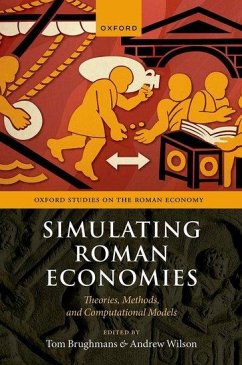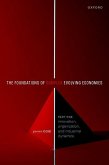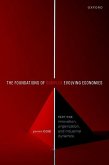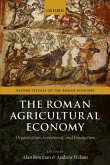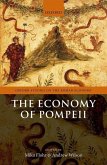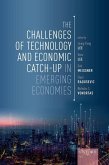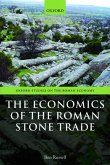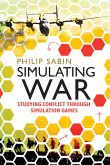Simulating Roman Economies
Theories, Methods, and Computational Models
Herausgeber: Brughmans, Tom; Wilson, Andrew
Simulating Roman Economies
Theories, Methods, and Computational Models
Herausgeber: Brughmans, Tom; Wilson, Andrew
- Gebundenes Buch
- Merkliste
- Auf die Merkliste
- Bewerten Bewerten
- Teilen
- Produkt teilen
- Produkterinnerung
- Produkterinnerung
Simulating Roman Economies aims to provide the common ground, guidance, and inspiration needed to make simulation methods part of the tools of the trade in Roman Studies, and to allow them to make constructive contributions to our understanding of the Roman economy.
Andere Kunden interessierten sich auch für
![The Foundations of Complex Evolving Economies The Foundations of Complex Evolving Economies]() Giovanni Dosi (Professor of Economics, Professor of Economics, SantThe Foundations of Complex Evolving Economies46,99 €
Giovanni Dosi (Professor of Economics, Professor of Economics, SantThe Foundations of Complex Evolving Economies46,99 €![The Foundations of Complex Evolving Economies The Foundations of Complex Evolving Economies]() Giovanni Dosi (Professor of Economics, Professor of Economics, SantThe Foundations of Complex Evolving Economies155,99 €
Giovanni Dosi (Professor of Economics, Professor of Economics, SantThe Foundations of Complex Evolving Economies155,99 €![Roman Agricultural Economy Roman Agricultural Economy]() Roman Agricultural Economy54,99 €
Roman Agricultural Economy54,99 €![The Economy of Pompeii The Economy of Pompeii]() The Economy of Pompeii130,99 €
The Economy of Pompeii130,99 €![The Challenges of Technology and Economic Catch-Up in Emerging Economies The Challenges of Technology and Economic Catch-Up in Emerging Economies]() The Challenges of Technology and Economic Catch-Up in Emerging Economies155,99 €
The Challenges of Technology and Economic Catch-Up in Emerging Economies155,99 €![Economics of the Roman Stone Trade Economics of the Roman Stone Trade]() Ben Russell (Lecturer in Classical Archaeology, School of History,Economics of the Roman Stone Trade47,99 €
Ben Russell (Lecturer in Classical Archaeology, School of History,Economics of the Roman Stone Trade47,99 €![Simulating War Simulating War]() Professor Philip SabinSimulating War37,99 €
Professor Philip SabinSimulating War37,99 €-
-
-
Simulating Roman Economies aims to provide the common ground, guidance, and inspiration needed to make simulation methods part of the tools of the trade in Roman Studies, and to allow them to make constructive contributions to our understanding of the Roman economy.
Produktdetails
- Produktdetails
- Oxford Studies on the Roman Economy
- Verlag: Oxford University Press
- Seitenzahl: 356
- Erscheinungstermin: 14. Dezember 2022
- Englisch
- Abmessung: 235mm x 157mm x 24mm
- Gewicht: 744g
- ISBN-13: 9780192857828
- ISBN-10: 0192857827
- Artikelnr.: 66143334
- Herstellerkennzeichnung
- Libri GmbH
- Europaallee 1
- 36244 Bad Hersfeld
- gpsr@libri.de
- Oxford Studies on the Roman Economy
- Verlag: Oxford University Press
- Seitenzahl: 356
- Erscheinungstermin: 14. Dezember 2022
- Englisch
- Abmessung: 235mm x 157mm x 24mm
- Gewicht: 744g
- ISBN-13: 9780192857828
- ISBN-10: 0192857827
- Artikelnr.: 66143334
- Herstellerkennzeichnung
- Libri GmbH
- Europaallee 1
- 36244 Bad Hersfeld
- gpsr@libri.de
Tom Brughmans is an associate professor at Aarhus University's Centre for Urban Network Evolutions (UrbNet) and Classical Archaeology. His research interests include the study of Roman economic and urban phenomena, past social networks, and visual signalling systems. He performs much of his work by applying computational methods such as network science, agent-based simulation, and geographical information systems. His research projects MERCURY and SIMREC developed educational resources and case studies to make simulation studies of the Roman economy more common (Leverhulme Early Career Fellowship and Marie-Curie Individual Fellowship). His ongoing project MINERVA aims to develop a highly detailed network model of the Roman road system, and to perform simulation experiments to explore the centuries-long distribution patterns revealed by Roman tableware and amphora data. Andrew Wilson is Professor of the Archaeology of the Roman Empire and Fellow of All Souls College, Oxford. His research focuses on the Roman economy, ancient technology, urbanism, and settlement. He has excavated in Italy, Libya, Tunisia, Syria, Cyprus, and Turkey. He is co-director (with Alan Bowman) of the Oxford Roman Economy Project (OxREP), and (with Chris Howgego) of the OxREP-Ashmolean Coin Hoards of the Roman Empire project; and he is also Principal Investigator of the Endangered Archaeology in the Middle East and North Africa project (EAMENA).
* INTRODUCTION
* 1: Tom Brughmans: Why simulate Roman economies?
* CASE STUDIES
* 2: Pascal Warnking: Simulating Roman maritime trade: modelling
sailing times and shipping routes
* 3: Marek Vlach: The Antonine Plague: A Case Study of Epidemiological
Modelling and Impact Evaluation
* 4: John William Hanson and Tom Brughmans: Settlement scale and
economic networks in the Roman Empire
* 5: Simon Carrignon, Tom Brughmans, and Iza Romanowska: Transmission
of cultural and economic strategies in inter-regional tableware trade
* 6: Xavier Rubio-Campillo and María Coto-Sarmiento: New approaches to
old questions: the exploration of large-scale trade dynamics using
hypothesis-testing frameworks
* 7: Brian Dermody, Alexander Chiu Smit, and Rens L.P.H. van Beek: A
Model of Grain Production and Trade in the Roman World
* 8: Pau de Soto and César Carreras: The economic and social evolution
of the Iberian Peninsula as revealed through analysis of Roman
transport infrastructure
* 9: Mark Groenhuijzen: Evaluating hypotheses about local transport
systems through spatial and network analysis: the Dutch part of the
Lower Rhine limes and its hinterland
* 10: Philip Verhagen: Modelling the basics of Roman demography: the
case of the Dutch limes
* DISCUSSION
* 11: Shawn Graham: Mapping the landscape of our ignorance
* 12: Andrew Wilson: Positioning computational modelling in Roman
studies
* 1: Tom Brughmans: Why simulate Roman economies?
* CASE STUDIES
* 2: Pascal Warnking: Simulating Roman maritime trade: modelling
sailing times and shipping routes
* 3: Marek Vlach: The Antonine Plague: A Case Study of Epidemiological
Modelling and Impact Evaluation
* 4: John William Hanson and Tom Brughmans: Settlement scale and
economic networks in the Roman Empire
* 5: Simon Carrignon, Tom Brughmans, and Iza Romanowska: Transmission
of cultural and economic strategies in inter-regional tableware trade
* 6: Xavier Rubio-Campillo and María Coto-Sarmiento: New approaches to
old questions: the exploration of large-scale trade dynamics using
hypothesis-testing frameworks
* 7: Brian Dermody, Alexander Chiu Smit, and Rens L.P.H. van Beek: A
Model of Grain Production and Trade in the Roman World
* 8: Pau de Soto and César Carreras: The economic and social evolution
of the Iberian Peninsula as revealed through analysis of Roman
transport infrastructure
* 9: Mark Groenhuijzen: Evaluating hypotheses about local transport
systems through spatial and network analysis: the Dutch part of the
Lower Rhine limes and its hinterland
* 10: Philip Verhagen: Modelling the basics of Roman demography: the
case of the Dutch limes
* DISCUSSION
* 11: Shawn Graham: Mapping the landscape of our ignorance
* 12: Andrew Wilson: Positioning computational modelling in Roman
studies
* INTRODUCTION
* 1: Tom Brughmans: Why simulate Roman economies?
* CASE STUDIES
* 2: Pascal Warnking: Simulating Roman maritime trade: modelling
sailing times and shipping routes
* 3: Marek Vlach: The Antonine Plague: A Case Study of Epidemiological
Modelling and Impact Evaluation
* 4: John William Hanson and Tom Brughmans: Settlement scale and
economic networks in the Roman Empire
* 5: Simon Carrignon, Tom Brughmans, and Iza Romanowska: Transmission
of cultural and economic strategies in inter-regional tableware trade
* 6: Xavier Rubio-Campillo and María Coto-Sarmiento: New approaches to
old questions: the exploration of large-scale trade dynamics using
hypothesis-testing frameworks
* 7: Brian Dermody, Alexander Chiu Smit, and Rens L.P.H. van Beek: A
Model of Grain Production and Trade in the Roman World
* 8: Pau de Soto and César Carreras: The economic and social evolution
of the Iberian Peninsula as revealed through analysis of Roman
transport infrastructure
* 9: Mark Groenhuijzen: Evaluating hypotheses about local transport
systems through spatial and network analysis: the Dutch part of the
Lower Rhine limes and its hinterland
* 10: Philip Verhagen: Modelling the basics of Roman demography: the
case of the Dutch limes
* DISCUSSION
* 11: Shawn Graham: Mapping the landscape of our ignorance
* 12: Andrew Wilson: Positioning computational modelling in Roman
studies
* 1: Tom Brughmans: Why simulate Roman economies?
* CASE STUDIES
* 2: Pascal Warnking: Simulating Roman maritime trade: modelling
sailing times and shipping routes
* 3: Marek Vlach: The Antonine Plague: A Case Study of Epidemiological
Modelling and Impact Evaluation
* 4: John William Hanson and Tom Brughmans: Settlement scale and
economic networks in the Roman Empire
* 5: Simon Carrignon, Tom Brughmans, and Iza Romanowska: Transmission
of cultural and economic strategies in inter-regional tableware trade
* 6: Xavier Rubio-Campillo and María Coto-Sarmiento: New approaches to
old questions: the exploration of large-scale trade dynamics using
hypothesis-testing frameworks
* 7: Brian Dermody, Alexander Chiu Smit, and Rens L.P.H. van Beek: A
Model of Grain Production and Trade in the Roman World
* 8: Pau de Soto and César Carreras: The economic and social evolution
of the Iberian Peninsula as revealed through analysis of Roman
transport infrastructure
* 9: Mark Groenhuijzen: Evaluating hypotheses about local transport
systems through spatial and network analysis: the Dutch part of the
Lower Rhine limes and its hinterland
* 10: Philip Verhagen: Modelling the basics of Roman demography: the
case of the Dutch limes
* DISCUSSION
* 11: Shawn Graham: Mapping the landscape of our ignorance
* 12: Andrew Wilson: Positioning computational modelling in Roman
studies

